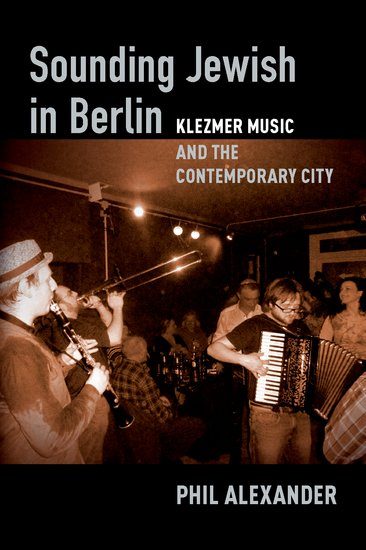You are currently browsing the tag archive for the ‘Berlin’ tag.
Sounding Jewish in Berlin: Klezmer Music and the Contemporary City. Phil Alexander. Oxford: Oxford University Press. 2021.
Reviewed by Zeke Levine
For the past two centuries, Berlin has maintained its role as a central crossroads of global politics, culture, and geography. The German capital is the focus of Phil Alexander’s Sounding Jewish in Berlin. Alexander probes the lively, yet complex contemporary Berlin klezmer scene, delving deeply into the ideological and aesthetic issues that shape it. While the klezmer revival has its roots in the United States, Alexander effectively and engagingly transports the reader to Berlin, an important locus for klezmer performance since the 1980s. Berlin, notes Alexander, is a complex setting for klezmer, given the city’s conflicted relationship with Jewish, particularly Eastern European Jewish, communities and folkways. Throughout the text, Alexander highlights thirty musicians and other creatives on the Berlin scene, framing the book around their experiences as well as his own extensive ethnographic experience as both a performer in, and keen observer of, the scene.
Read the rest of this entry »Judaism Musical and Unmusical. Michael P. Steinberg. Chicago: University of Chicago Press, 2007. 270 pp. ISBN 978-0-2267-7195-3
In Judaism Musical and Unmusical, Michael P. Steinberg takes the reader on a journey through predominantly but not exclusively Central European Jewish history and culture in the nineteenth and twentieth centuries, at times privileging music as a focal point of cultural discourse. The eight essays in this volume, most of which have been published before, are loosely connected musings about the different facets of modernity and Judentum, and involve the concepts of memory, secularity, and aesthetics, among others. In each chapter Steinberg weaves different threads together, from art to psychoanalysis, from architecture to music. Steinberg’s book, which in a larger sense is a discourse about identity and Judaism, begins with an essay on Edward Said and his propositions of Jewish identity, and follows with individual case studies of known intellectuals and their work. Steinberg traces the subject of Judaism in Sigmund Freud’s late classic Moses and Monotheism and in the writings of Henry James, Eduard Fuchs, and Walter Benjamin; and he explores the intellectualism of Italian Jewish historian Arnaldo Momigliano. Further chapters center on the artist Charlotte Salomon and her Life? or Theater? and Leonard Bernstein in Vienna. The journey ends in Berlin with a critique of its Jewish Museum and an assessment of some recent scholarship on German Jewish subjects, which cannot compensate for the absence of a full bibliography at the end of the book.


 During the last two decades a formidable number of excellent studies have appeared in English and German that have given us an ever fuller picture of the compromised, politicized reality of Germany’s musical culture during the National Socialist period. Lily Hirsch’s book, A Jewish Orchestra in Nazi Germany: Musical Politics and the Berlin Jewish Culture League, is a valuable contribution to this body of knowledge.
During the last two decades a formidable number of excellent studies have appeared in English and German that have given us an ever fuller picture of the compromised, politicized reality of Germany’s musical culture during the National Socialist period. Lily Hirsch’s book, A Jewish Orchestra in Nazi Germany: Musical Politics and the Berlin Jewish Culture League, is a valuable contribution to this body of knowledge.
